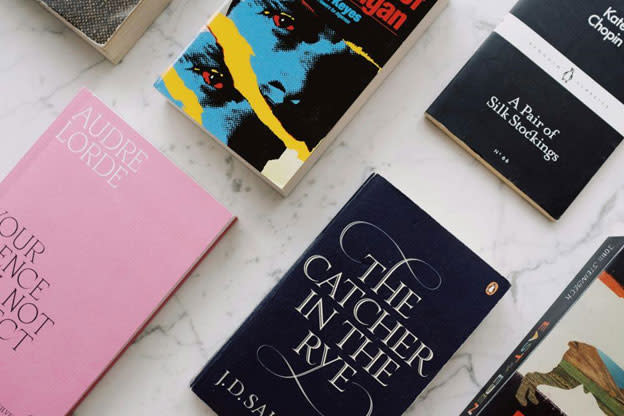
How long can you scroll through your TikTok #fyp (For You Page) before you start feeling your brain turning into mush? Do you end up with an empty feeling of guilt when you finally slink off to bed at 4 o’clock in the morning?
This is why: something in you craves substance, depth, and a connection to something more profound.
Don’t be scared of what you’re about to read next. There IS a way to gain something satisfying, like improve your English skills, while escaping the devouring vortex of social media. Welcome to the world of classic literature.
Hang on! Before you roll your eyes and click away, hear us out.
There’s a reason why these books that are decades, if not centuries, old, have continued to capture the world’s imagination till today. These are stories that endure not because they're trendy or marketable but because they tap into universal themes and truths that resonate across generations.
Delve into our guide to the classics (and how to use them to your advantage in your IELTS prep) and you’ll soon see that the classics aren’t just about dusty old books and archaic language. They can unlock a treasure trove of language skills and cultural insights that can help you ace your IELTS test and beyond.
So, what’s so important about the classics?
The question in your mind may be: why bother with classic literature when there's so much else, like contemporary fiction and non-fiction, at your fingertips?
Here's the thing: classic literature offers a unique opportunity to hone your English skills in ways that modern-day texts simply can't match. While contemporary lit may be more relatable to our current lives, classics provide a window into different eras, cultures, and perspectives, helping you develop a deeper understanding of the English language.
Plus, the IELTS test needs you to demonstrate your ability to navigate complex language structures and nuanced meanings, skills that classic literature can help you master. Whether you're grappling with the complexities of human nature in Pride and Prejudice or unravelling the mysteries of morality in Frankenstein, each classic tome offers its own unique masterclass in storytelling and language craftsmanship.
But perhaps most importantly, reading the classics is an act of rebellion against the fleeting distractions of the digital age today. In our world where attention spans are shrinking and instant gratification is the norm, taking the time to savour the slow burn of a classic novel is a radical act that will reward you with self-care and intellectual nourishment. It's a reminder that some things – like a well-crafted sentence or a thought-provoking metaphor – are worth savouring, even in a world obsessed with speed and efficiency.
Ready to start your journey into the world of classic lit? Here are four tips to help you improve your English proficiency along the way.
1. Pick the right books
Before you dive headfirst into the world of classic literature, it's essential to choose books that are accessible and engaging, especially if you're new to the genre. Classics like Pride and Prejudice by Jane Austen or the Sherlock Holmes series by Sir Arthur Conan Doyle are not only timeless tales but also relatively easy to understand, making them perfect for English language learners. So, skip the dense philosophical tomes and opt for narratives that are rich in plot and character development.
Selecting the right classics is also about relevance and personal interest. Consider your own preferences and areas of curiosity. For example, if you're passionate about social justice, you might gravitate towards classic novels like To Kill a Mockingbird by Harper Lee or 1984 by George Orwell, both of which explore themes of power, oppression, and morality. By choosing books that resonate with you on a personal level, you'll be more motivated to engage with the text and extract meaningful insights.
2. Understand the importance of context
One of the challenges of reading classic literature is grappling with unfamiliar settings and cultural contexts. But fear not – a little bit of background research can go a long way. Before delving into a classic novel, take some time to familiarise yourself with the historical period, societal norms, and language of the time. This will not only enhance your comprehension but also deepen your appreciation for the text's significance.
When reading To Kill a Mockingbird, for example, which is set in rural Alabama during the Great Depression, it’s crucial to understand the social mores and tensions surrounding race relations in the US at the time. By contextualising the story within its historical framework, you'll gain valuable insights into the characters' motivations and the underlying themes of discrimination, class, courage, and even the loss of innocence.
3. Annotate and take notes
Reading classic literature can sometimes feel like deciphering a foreign language, especially when faced with archaic vocabulary and syntax. That's where annotations and note-taking come in handy. Don't hesitate to jot down unfamiliar words, interesting phrases, or cultural references as you read. Not only will this help you expand your vocabulary, but it will also improve your ability to analyse and interpret complex texts – a crucial skill for the IELTS test.
As you encounter unfamiliar words or phrases, take a moment to look them up in a dictionary or online resource. Write down the definitions and any additional context that helps clarify their meaning within the text. Similarly, pay attention to unique grammatical structures, figures of speech, or literary devices employed by the author. By annotating these elements and jotting down your observations, you'll develop a deeper understanding of the text's stylistic choices and thematic nuances. This can help you learn how to write a more sophisticated essay.
Furthermore, consider keeping a reading journal or notebook dedicated to your classic literature studies. In addition to vocabulary and grammar notes, use this journal to record your thoughts, questions, and reflections as you progress through each book. Engaging with the text on a personal level and actively participating in the reading process will not only enhance your comprehension but also foster a deeper appreciation for the richness and complexity of classic literature.
4. Catch up with modern adaptations
If the thought of tackling a dense Victorian novel feels daunting, why not start with a modern adaptation instead? Modern adaptations of classic literature serve as a bridge between past and present, offering a contemporary lens through which to interpret timeless stories. Whether it's a lavish period drama or a gritty reinterpretation, these adaptations bring the classics to life in ways that resonate with today's audiences.
From BBC's Sherlock to the multiple film adaptations of Pride and Prejudice, there are plenty of ways to experience classic literature in a more accessible format. Watching these adaptations can help you digest the plot, characters, and themes of the original text, making it easier to dive into the original book with confidence.
Additionally, don't underestimate the power of audiobooks and podcasts as alternative mediums for experiencing classic literature. Listening to professional narrators or engaging discussions about classic texts can provide valuable context and interpretation, enriching your reading experience and fostering a sense of community among fellow literature enthusiasts.

So, there you have it – our top tips for reading the classics to improve your English skills. Whether you're preparing for the IELTS test or simply looking to expand your literary horizons, delving into the world of classic literature can be a rewarding and enriching experience.
If you're in need of further resources or guidance on your English language journey, we welcome you to explore IDP’s wide catalogue of IELTS preparation courses, online IELTS masterclass courses, and even free online IELTS tests to help you gauge your English proficiency prior to test day.
Download the IELTS by IDP app to get our IELTS resources at your fingertips, or book your IELTS test with IDP to get started on the next step of your English proficiency journey.
